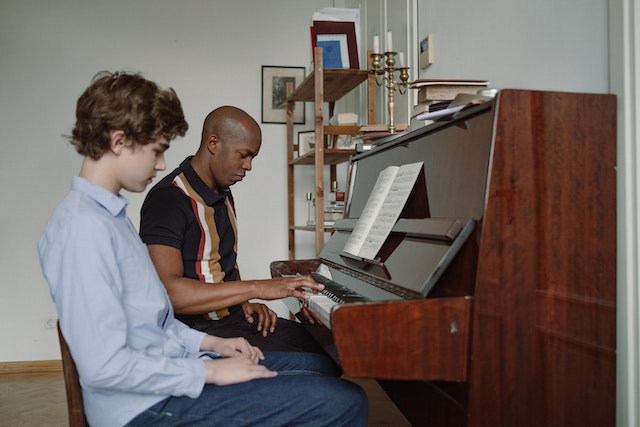Songs, praises: How to be church music minister
Since Biblical times, music has played a role in offering praises and worship to God.
It serves as a powerful medium for expressing devotion and connecting with Him.
For many churches, the role of the music minister is crucial in creating a meaningful and inspiring worship experience.
Because of this, becoming a church music minister can be a fulfilling and rewarding way to serve your community and deepen your spiritual practice.
This article will briefly touch on the music ministry and what it means to be a church music minister and explore the key elements of becoming one.

Music Ministry
According to ChristianMinistryEDU.org, music ministry is a crucial component of religious worship. It serves as a means of expressing devotion and connecting with God.
It is not merely a support service for the sermon. Rather, it is a vessel.
Through the music ministry, believers can show their gratitude toward God.
As stated in Colossians 3:16, music ministry allows believers to share wisdom through psalms, hymns, and songs from the Spirit.
It is a way for the church to celebrate and glorify God while encouraging and admonishing its members.
There are many ways you can engage in music ministry. You can lead praise and worship in a church or reach out to local and global communities.
However, becoming a church music minister is a common way to participate in the music ministry.
Purpose of Church Music Minister
Deciding whether to pursue a career as a church music minister can be difficult.
Zippia stated that the Bureau of Labor Statistics assumed that the projected growth rate for this occupation is “little or no change” at 1% from 2018 through 2028.
Additionally, the number of opportunities available is expected to be around 800 by 2028.
The statistics suggest that while becoming a church music minister can be a fulfilling and rewarding career path, it may not be the most lucrative or in-demand occupation.
However, if you are committed to pursuing this career, you can expect to perform a variety of responsibilities.
According to Bigger Faith, the role of a church music minister primarily involves leading worship services through song and music.
As such, you need to possess strong musical abilities. This may include playing an instrument like a piano, keyboard, or organ.
Collaboration with the senior pastor and other congregation members is also a key component of your role.
Together, you organize weekly worship services and special services. This includes weddings and funerals.
As a church music minister, you may also meet with church members to plan and provide musical arrangements for these events.
Sometimes, you may be hired to develop and enhance a particular aspect of a church’s music program, such as expanding a choir.
Depending on the size and needs of your church, you may work either part-time or full-time.
Your other responsibilities can include advising and directing musicians serving in the church.
It may also pertain to creating a performance schedule for singers and musicians, and offering music or singing lessons to interested church members.
The tasks require not only musical talent, but also organizational and interpersonal skills.
It makes your role as a church music minister a multifaceted one.

How to be Church Music Minister
Build Relationship with Christ
While being a skilled musician and a good leader is important for being a church music minister, you must build and maintain a strong relationship with Christ.
It serves as your foundation for leading worship through music. It influences the congregation’s experience and helps them connect with God.
Because of this, your relationship must be genuine and authentic.
ChristianMinistryEDU.org suggested that you seek personal growth in your relationship with Christ.
Besides, do regular devotions, surround yourself with Christ-centered relationships, and serve others in need.
You should have strong convictions based on Biblical teachings.
Get Music Degree
Earning a music degree is a common requirement for church music ministers.
According to Bigger Faith, a degree in music can provide you with the necessary knowledge and skills to effectively lead a congregation in worship.
You must have a strong understanding of traditional and contemporary worship music.
Moreover, you also need to be proficient in playing an instrument or singing.
Pursuing a dual degree in music and theology or ministry studies can also be helpful.
It allows you to integrate your passion for music with your calling to serve in ministry.
You can also attend a seminary. In this way, you will gain a more comprehensive understanding of ministry and the Bible, which can benefit you in your role.

Take Music Classes
Earning a degree may set you apart, but taking classes can still provide you with valuable training and education.
Ashley Danyew stated that you could take classes in music theory, composition, conducting, and arranging.
Additionally, vocal technique and performance classes can help you improve your singing skills and lead congregational singing more effectively.
You may also consider taking classes in sound engineering or music technology.
It would help you better understand the technical aspects of music production and sound design.
Develop Musical, Leadership Skills
Danyew suggested that one way to do this is by taking private lessons.
Additionally, practicing conducting and accompanying skills can help you become a more versatile musician.
In turn, it allows you to lead choirs and ensembles and accompany soloists and instrumentalists.
Aside from your musical skills, you must also hone your leadership skills in musical and non-musical settings.
It includes learning how to communicate effectively with other musicians and congregation members and how to plan and organize musical events and services.
Developing your sight-reading skills can also be beneficial. This lets you quickly read and interpret sheet music during rehearsals and performances.
With this, building a varied musical skill set can prepare you to lead worship effectively.

Regularly Attend Church Worship Services
A profession in church music is distinct from other music positions.
It is crucial to attend church regularly to prepare for a career in church music
In line with this, attending various churches and encountering diverse styles of worship can provide significant learning experiences.
According to Danyew, attending church permits you to engage in worship. You gain insight into it from the congregation’s viewpoint. This would benefit you in your future ministry work.
By doing so, you would be better equipped to anticipate the congregation’s desires.
Become Involved in Activities of Church’s Music Program
Becoming involved in your church’s music program can be beneficial if you want to pursue a career in church music.
Danyew stated that there are several ways to participate.
It includes singing in a choir, playing handbells, or volunteering to teach a children’s choir.
You can also help with administrative tasks or offer to accompany a choir, soloist, or instrumentalist if you were a pianist.
The experiences would provide you with practical knowledge and a behind-the-scenes look at what it takes to run a church music program.

Shadow Church Music Minister
Finding a mentor can be incredibly valuable for anyone pursuing a career in church music.
You can learn more about what their job entails and get practical experience by shadowing a church musician.
According to Danyew, you should consider interning with someone during the summer or academic year.
Be sure to ask them about working with other staff members and overseeing other music staff.
Moreover, observe how they work with families for weddings and funerals, and where they find teaching and ministry resources.
Try seeing firsthand the challenges and rewards of the position.
You can also ask about the skills they have had to develop independently and what they wished they had learned.
Getting some experience playing, teaching, or directing and receiving feedback from your mentor would help in learning and growing as a church musician and leader.
Acquire Experience as a Church Music Minister
If you were aiming to gain experience in church music, subbing at local churches can be a great opportunity.
You can offer your services as a substitute pianist or organist by reaching out to local church musicians.
It would help out the church and would allow you to gain practical experience.
Another, ensure you have a copy of the hymnal and arrive early to practice before the service.
Danyew stated that subbing at different churches can also expose you to different denominations and worship styles, which can broaden your understanding of church music.
Playing different instruments and becoming familiar with hymnals can also help you develop your skills and versatility as a church musician.
Because of this, do not hesitate to take advantage of this opportunity to gain valuable experience and grow as a musician.

Dedicate Yourself to Word of God
Prioritize the study and application of the Word of God. This includes personal devotions and the ability to incorporate biblical truths into worship services.
ChristianMinistryEDU.org states that you are called to lead others in worship and draw them closer to God.
It added it cannot be done without a deep understanding of the gospel and a willingness to live out its teachings.
You can inspire others and help create a worship environment that is centered on Christ by dedicating yourself to His words.
Have Heart for Service
Remember that your role extends beyond leading music. You are also called to serve and support your community.
It means being involved in the lives of those around you and actively seeking ways to meet their needs.
According to ChristianMinistryEDU.org, having a heart for service is essential.
It added that this applies to volunteering in the community, leading small groups, or simply offering a listening ear.
Moreover, you can help create a welcoming and inclusive church environment that reflects the heart of Christ by embodying a spirit of love and compassion.

The music ministry plays a vital role in creating a spiritual and uplifting atmosphere in religious worship.
As a church music minister, you can inspire and connect with your community.
This article has highlighted some key elements essential to becoming a church music minister.
Generally, it included pursuing a dedicated relationship with God, acquiring practical experience, and being willing to serve others.
More from Crossmap: Online disciples: How to evangelize using social media











